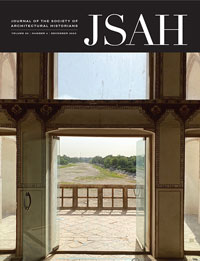In Fascist Italy, architecture and urban planning served key roles in the formation of new social identities. Yet while the transformation of Rome and the construction of numerous new cities closely followed the regime’s rhetorical goals, the development of Milan—the nation’s business center—often responded to a far more diverse range of concerns. Lucy Maulsby examines the transformation of Milan in relation to the political, commercial, and cultural forces at play locally and throughout Italy in this important new book.
Fascism, Architecture, and the Claiming of Modern Milan, 1922–1943 is Maulsby’s first monographic work and has been recognized by the Society of Architectural Historians with a Mellon Author Award. The author, an assistant professor in the School of Architecture at Northeastern University, developed this book from her 2007 doctoral dissertation at Columbia University. Endowed with lucid prose and well-structured arguments, the text provides an in-depth study of both the design of the urban fabric and its significant monuments. Maulsby is concerned with the elites and power structures that commissioned the built environment, the architects who gave form to their concerns, and the public that used—and was shaped by—those spaces. She explores the city’s symbolic landscapes and describes its everyday spaces with an admirable attentiveness to detail.
Read more
here

